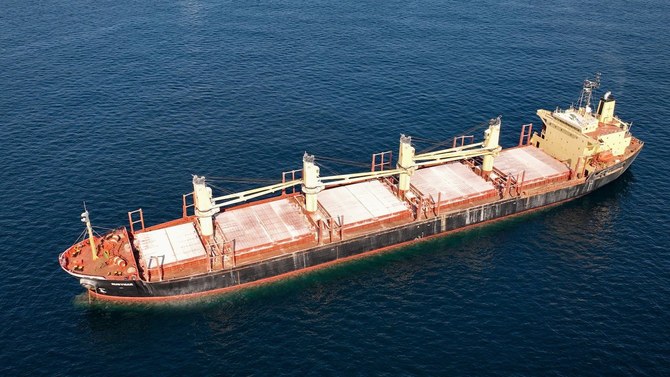AL-MUKALLA: Yemen’s Houthi militia has pledged to prevent the rescue of a leaking UK-linked ship in the Red Sea before humanitarian aid can reach Gaza, raising concerns that they would use the ship as leverage.
On Feb. 18, the Houthis fired a missile that severely damaged a UK-owned and Belize-flagged ship, causing an 18-mile oil slick in the Red Sea and threatening a major environmental disaster if its cargo of over 41,000 tons of fertilizer leaked into the sea, according to the US Central Command.
The leak has caused the Yemeni government to seek international aid from countries and conservation groups to secure the ship.
Mohammed Ali Al-Houthi, a Houthi leader, said that they would only allow the world to retrieve the leaking ship if people in Gaza had access to food, water, and medicine, prompting Yemenis to express concern that the Houthis might be using the ship as a bargaining chip, as they had done with the floating tanker Safer in the past.
“The sinking British ship might be hauled in return for delivering aid vehicles to Gaza,” Al-Houthi said on X.
On Saturday night, the US and UK militaries launched additional strikes against 18 locations in Houthi-controlled Yemen, including underground arms and missile storage facilities, air defense systems, radar, a helicopter, and one-way attack unmanned aerial systems, according to a statement from the US Central Command.
This comes as UK Foreign Minister David Cameron pledged on Sunday to launch more attacks to discourage the Houthis from undermining international navigation freedom in the Red Sea.
“Despite repeated warnings, the Houthis have continued their attacks on shipping in the Red Sea, including targeting UK-linked vessels, undermining regional stability. We have been clear that we will back our words with actions,” he said on X.
In Sanaa, the Houthis defied pleas to end their Red Sea strikes by claiming to have fired missiles on Saturday at the US-flagged and operated oil tanker MV Torm Thor and drones at US Navy ships in the Gulf of Aden.
“Yemen’s Armed Forces affirm that they would counter the American-British escalation with more qualitative military operations against all hostile targets in the Red and Arab seas,” Houthi military spokesperson Yahya Sarea said in a statement.
At the same time, Yemeni officials and experts believe the Houthis would use the leaking ship as leverage to get concessions from the world, including legitimacy.
“We’ve seen that before. The Houthis used Safer as leverage for years with complete disregard for the potential environmental disaster it would have caused if leaked,” Nadwa Al-Dawsari, a non-resident fellow at the Middle East Institute in Washington, D.C., told Arab News.
After years of opposition, the Houthis agreed in 2023 to allow UN engineers to dump more than a million barrels of oil off the deteriorating floating FSO Safer tanker moored near Yemen’s western city of Hodeidah, averting an environmental calamity.
Ali Al-Fakih, editor of Al-Masdar Online, said that although the world’s attention is not as focused on the leaking UK-owned ship as it was on the Safer, the Houthis would continue to use the leakage to obtain international legitimacy for their militia.
“The Houthis appear unconcerned about the potential harm to Yemen’s maritime ecology or the loss of thousands of fishermen’s livelihoods,” Al-Fakih told Arab News, adding: “They want the world to acknowledge their sovereignty over the sea and depend on them as local agents to safeguard the waterways, which would offer them the legitimacy they currently lack.”


























